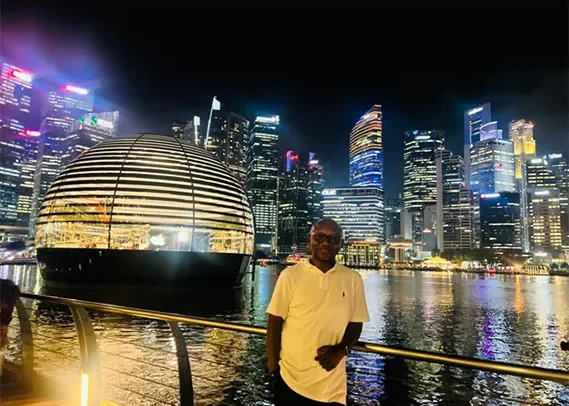The writer in Singapore
Assuming Singapore stops developing in 2025 and Ghana maintains a steady growth rate, it would take Ghana fifty to seventy (50-70) years to catch up with Singapore and here’s why.
Singaporeans are happier than Ghanaians and live longer than us. The average life expectancy in Singapore is 86years (84 years for men and 89 years for women). In Ghana it is 69 years on average.
Singapore gained independence from British colonial rule on 3rd June 1959, two years and three months after Ghana gained independence, and has had only three Prime Ministers since independence.
It is a small country with an estimated population of 5.86 million as of March 2025 according to government figures.
Singapore has been ruled by one political party (the People’s Action Party) since 1965, even though there are ineffective opposition parties. They hold parliamentary elections every 5years and presidential elections every 6 years. The Prime Minister is the head of government in Singapore.
While Ghanaians are obsessed with four yearly elections that produce little value by way of improvement in living conditions, free media and Western styled democracy, Singaporeans are not.
What use is Western styled democracy when the people are unhappy and dying young?
The media landscape in Singapore is dominated by government linked media houses. Yet Singaporeans are happier and live better and longer than us.
How has this small but highly developed country gone so far ahead of Ghana in spite of gaining independence a couple of years after us? Certainly age doesn’t determine success or failure. It comes down to leadership and here’s what their leadership has provided.
They focused on building a stable, strong and business friendly economy.
Like Kwame Nkrumah intended, Lee Kwan Yew, their independence leader who ruled until 1990 focused on giving their citizenry a very high standard of living. The latest available data puts its GDP per capita at $90,674 USD. To understand what Kwame Nkrumah was doing, one needs to visit and see how Singapore has developed.
They built a world class infrastructure. In Ghana, contracts are often given to ill equipped, less competent party apparatchiks whose work doesn’t last beyond a rainy season. Singaporeans frown upon any form of corruption, including nepotism, cronyism and tribalism. They have an efficient public transportation system, well planned urban development and excellent telecommunications infrastructure that would make Ghanaians bite their fingers in envy. We have every reason to succeed.
The Leadership of Singapore made sure their country is a leader in innovation by spending a lot on research and development.
They have a very high intolerance for corruption. Corruption is near zero. In Singapore, public officials at every level are not allowed to take gifts or ask for “bronya adie” or Christmas gifts.
To estimate how long it might take for Ghana to catch up with Singapore in development, one needs to consider various factors like GDP per capita, human development indices, and infrastructure. Here are a few indicators:
GDP per capita (nominal) Singapore (2024): Around $90,674 Ghana (2024): Around $2,374 according to the IMF.
Assuming Singapore stops developing in 2025 and Ghana maintains a steady growth rate, let’s consider a few scenarios:
Scenario 1: Ghana grows at 5% annually
Ghana’s GDP per capita would need to increase significantly to reach Singapore’s level.
Based on historical growth rates, it might take Ghana around 50-70 years to reach Singapore’s current GDP per capita.
Scenario 2: Ghana grows at 7% annually
With a higher growth rate, Ghana might be able to catch up faster, potentially within 40-60 years.
Other development indicators such as Human Development Index (HDI). Ghana’s HDI score has been improving, but there’s still a significant gap between Ghana and Singapore.
Infrastructure – Ghana would need significant investments in infrastructure, education, and healthcare to bridge the gap with Singapore.
Unlike Ghana, Singapore has nearly zero natural resources. Our economy is heavily reliant of traditional export commodities like gold and cocoa. This heavy reliance on cocoa, gold, timber and so on makes us vulnerable to external shocks. Until we diversify the economy, we would be in serious trouble in the next ten years, especially in an uncertain global environment.
If Ghana maintains a steady growth rate and addresses its development challenges, it might take several decades to catch up with Singapore’s level of development
The time has come to take a deeper look at our election cycle. We hold too many elections, yet we are lagging behind, in spite of our endowment in Human Resources and natural resources.
Our presidential elections should be a seven year one-term-only for presidential elections while parliamentary elections move to a five yearly cycle. This would reduce the pettiness, corruption and fixation with upcoming elections that put government business at near standstill.
Once an elected president knows he has only one term, it is highly likely they will do everything to make a positive impact and leave a lasting positive legacy.
Source: Ras Mubarak


